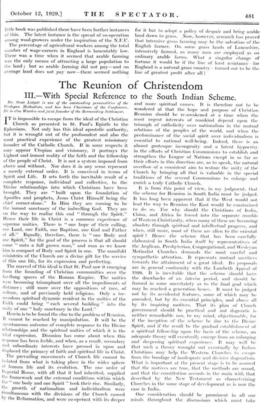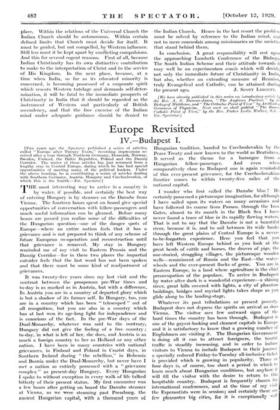The Reunion of Christendom
III.—With Special Reference to the South Indian Scheme.
Dr. Scott Lidgett is one of the outstanding personalities of the Wesleyan kethodists, and has been Chairman of the Conference. He is also Warden and joint founder of the Bermondsey Settlement.
IT is impossible to escape from the ideal of the Christian Church as presented in St. Paul's Epistle to the Ephesians. Not only has this ideal apostolic authority, but it is wrought out of the profoundest and also the most practical experience of the greatest missionary founder of the Catholic Church. If in some respects it may appear Utopian and visionary, it portrays the highest and inmost reality of the faith and the fellowship of the people of Christ. It is not a system imposed from above and without. Nor does it in any sense represent a merely external order. It is conceived in terms of Spirit and Life. It sets forth the inevitable result of a complete response, individual and collective, to the Divine relationships into which Christians have been brought. They are " built upon the foundation of Apostles and prophets, Jesus Christ Himself being the chief corner-stone." In Him they are coming to be the inmost sanctuary of the indwelling God. They are on the way to realize this end " through the Spirit." Hence their life in Christ is a common experience of supreme unities. There is " one hope of their calling, one Lord, one Faith, one Baptism, one God and Father of all." . Equally, therefore, there is " one Body and one Spirit," for the goal of the process is that all should come " unto a full grown man," and man as we know him is compact of Body and Spirit in one. The manifold ministries of the Church are a divine gift for the service of this one life, for its expression and perfecting.
The marvel of this ideal is that St. Paul saw it emerging from the founding of Christian communities over the far-flung spaces of the Roman Empire. The unities were becoming triumphant over all the impediments of distance ; still more over the oppositions of race, of culture, and of previously held religions. Only a tre- mendous spiritual dynamic resident in the unities of the Faith could bring " each several . building " into the unity of one " holy sanctuary in the Lord."
Herein is to be found the clue to the problem of Reunion. It cannot be reached by manipulation. It will be the spontaneous outcome of complete response to the Divine relationships and the spiritual unities of which it is the vital expression. Disunion has come about when this response has been feeble, and when, as a result, secondary and subordinate interests have .pressed in upon and displaced the primacy of faith and spiritual life in Christ.
The prevailing movements of Church life cannot be isolated from what is taking place in the wider sphere of human life and its evolution. The one order of Imperial.Rome, with all that it had inherited, supplied the framework and the external conditions within which the " one body and one Spirit " took their rise. Similarly, the growth of nationalism and individualism were simultaneous with the divisions of the Church caused by the Reformation, and were'co-operant with its deeper and more spiritual causes. It is therefore not to be wondered at that the hope and purpose of Christian Reunion should be re-awakened at a time when the most urgent interests of mankind depend upon the triumph of catholicity over nationalism in the mutual relations of the peoples of the world, and when the predominance of the social spirit over individualism is essential to national well-being. Indeed, there is an almost grotesque incongruity and a latent hypocrisy in the efforts of Christian Communions to establish and strengthen the League of Nations except in so far as their efforts in this direction are, so to speak, the natural overflow of a consistent aim to restore the unity of the Church by bringing all that is valuable in the special traditions of the several Communions to enlarge and enrich a truly Catholic Church.
It is from this point of view, in my judgment, that the scheme for Reunion in South India must be judged. It has long been apparent that if the West would not lead the way to Reunion the East would be constrained to do so. For why should the Christians of India, China, and Africa be forced into the separate moulds of Western Christianity, when many of these are becoming obsolete through spiritual and intellectual progress, and when, still more, most of them are alien to the oriental spirit ? Hence the scheme that has been carefully elaborated in South India itself by representatives of the Anglican, Presbyterian, Congregational, and Wesleyan Methodist Churches demands the most careful and sympathetic attention. It represents mutual sacrifices towards the attainment of a great ideal. Its proposals are in general conformity with the. Lambeth Appeal of 1920. It is inevitable that the scheme should have the drawbacks of an interim period, and should be framed in some uncertainty as to the final goal which may be reached a generation hence. It must he judged not by its accidental features, some of which may be amended, but by its essential principles, and above all by its inspiring motives. That its plan of Church government should be practical and not dogmatic is neither remarkable nor, to my mind, objectionable, for if the inception of the scheme be due to the Divine Spirit, and if the result he the gradual establishment of a spiritual fellowship upon the basis of the scheme, an adequate theory will eventually emerge from an enlarging and deepening spiritual experience. It may well be that such a theory wrought out eventually by Indian Christians may help the Western Churches to escape from the bondage of inadequate and divisive dogmatism. What is important at the present stage is to be assured that the motives arc true, that the methods are sound, and that the constitution accords in the main with that described by the New Testament as characterizing Churches in the same stage of development as is now the case in India.
One consideration should be prominent in all our minds throughout the discussions which must take , place. Within the relations of the Universal Church the . Indian Church should be autonomous. Within certain defined limits that Church must decide for itself. It must be guided, but not compelled, by Western influence. Still less must it be kept apart by conflicting compulsions. And this for several cogent reasons. First of all, because Indian Christianity has its own distinctive contribution to make to the interpretation of Christ and to the service of His Kingdom. In the next place, because, at a time when India, so far as its educated minority is concerned, is becoming possessed of a corporate spirit which resents Western tutelage and demands self-deter- mination, it will be .fatal to the immediate prospects of Christianity in India that it should be regarded as the instrument of Western and particularly of British ascendency, and that the free exercise of the Indian mind under adequate guidance should be denied to -the Indian Church. Hence in the last resort the problen must be solved by reference to the Indian mind, an( . not to mere concordats among- missionaries or the societie that stand behind them.
In conclusion. A great responsibility will rest upoi the approaching Lambeth Conference of the Bishops The South Indian Scheme and their attitude towards may well be an experimentum crtwis which will decide not only the immediate future of Christianity in India 'but also, whether an extending measure of Reunion truly Evangelical and Catholic, can be attained during [We have already published in this series an introductory article Gi the Rev. A. S. Duncan-Jones, " The Anglican Position" by th, Bishop of Middleton-, and" The Orthodox Point of View" by Archbishop Germans of Thyateira. Next week we shall publish The Ronun Catholic Point of View," by the Rev. Father Leslie Walker, S.J :- ED. Spectator.]









































 Previous page
Previous page